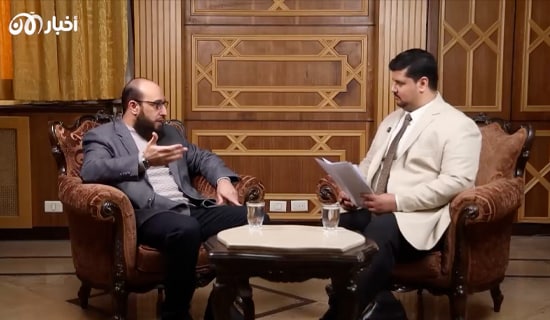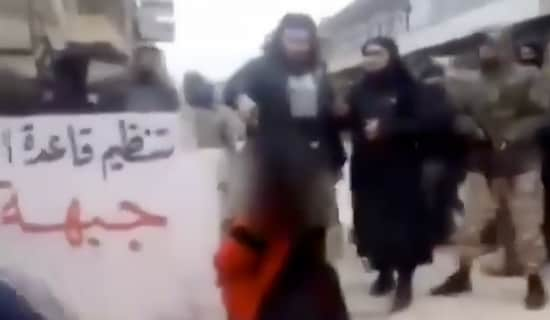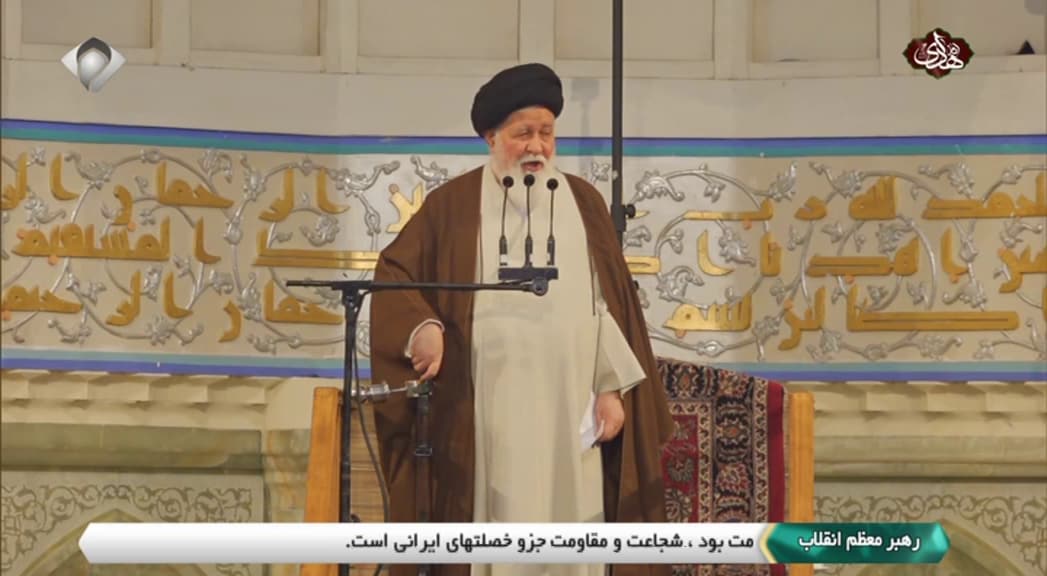
Following are excerpts from an Iranian TV report about the Mojahedin-e Khalq organization which aired on Press TV on October 30, 2008. The English is transcribed from the original.
Batool Soltani: My name is Batool Soltani. I'm a former leadership member of the Mojahedin-e Khalq. I left the group after twenty years. I have two children – a boy and a girl – and I haven't seen them for 17 years. This is me. I am holding my little girl, after joining Mojahedin-e Khalq. This is her now. She is 21. I haven't seen her for 17 years. They took my children away from me, in an ideological move. I left the Mojahedin-e Khalq because I found they lie, and because they ruined my life.
[...]
Interviewer: As far as the inner workings of the Mojahedin-e Khalq - as far as the emotional detachments that the organization demanded, as far as a parent had to be emotionally detached from their children, husbands and wives were forced to divorce each other – can you explain a little bit why this emotional detachment was demanded of the members?
Ebrahim Khodabandeh, former Mojahedin-e Khalq member: This all can be explained when we consider the Mojahedin-e Khalq as a cult – an established cult, which uses psychological manipulation over its members to control their minds.
Batool Soltani: When somebody joins the Mojahedin-e Khalq organization, they have to go through a specific system, in which they will be under close control of the authorities. For example, if anyone has a thought that contradicts the Mojahedin-e Khalq code of ethics, it needs to be reported to the authorities on a daily basis. Suppressing and denial of the members' feelings and emotions is another tactic of Rajavi's organization. For example, members have to free themselves of all attachments in life, including their feelings for their children, family, and mates. Marriage was forbidden, and if the members were married, they were obliged to divorce quickly, and send their children to orphanages.
[...]
Now Rajavi wishes for the Ashraf camp to be kept intact and functioning. He himself had mentioned many times that the Ashraf camp was the strategic weakness of the cult. That's why Rajavi would do anything to keep the Ashraf camp going, even by forcing its members to set themselves on fire, in order to gain international recognition and attention.
[...]
Ebrahim Khodabandeh: As I said, once the strategy of armed struggle of the Mojahedin failed in Iran, they were at a dead end. They needed some sort of technique to keep their followers within the organization, and that's why they had to move to Iraq. The organization claims that the Ashraf camp is the vessel of their strategy, which is armed struggle, but I would say that prior to that, it is the vessel of ideology, or rather, it is the vessel of the psychological methodology to brainwash the people. They wouldn't be able to gather so many people in any country but in Iraq, under Saddam Hussein – because they had total control over these people, and no outsider had any control over them. Once Saddam Hussein was toppled, the American provided the same facility. They were guarding the Ashraf camp, and giving the leaders of the organization in Ashraf total control over the lives of the people who are there.
Interviewer: So the Americans, when they came in, allowed the leadership to continue the status quo, basically?
Ebrahim Khodabandeh: Exactly, although they disarmed them. But they left them with the techniques they were using before.
Interviewer: Did they observe the techniques that were being used?
Ebrahim Khodabandeh: They are totally aware of them, because those who left the organization have been interviewed by them for hours, and they have said everything about the organization. So I should say that the Americans know everything about the organization, and they know it is a cult of personality. But for some reasons, they have allowed the leaders to gain mental control over them – even to not allow them to visit their families, the families that haven't seen their loved ones for more than two decades.
[...]
Batool Soltani: As for Mojahedin-e Khalq involvement in the massacre of the Kurds in northern Iraq, and other terrorist activities, I can tell you that this organization only considers its own benefits. Kurds were considered the organization's common enemy, along with Iraq and Saddam Hussein's regime. Since the Mojahedin-e Khalq main camp was located in Iraq, they decided to help Saddam's regime on the Kurds' massacre. We were considered part of Saddam's army, and we implemented all of Saddam's requests without raising a question. As for now, in order to save themselves, the Mojahedin-e Khalq would do anything, be it spying for the U.S. or for the U.K. Rajavi said once that he would even disguise into women's clothing should the situation arise, for the sake of the cause.
[...]
Ebrahim Khodabandeh: For example, as you know, within the organization, sex is banned, having a family is banned. They have to give up all family life, emotions, love, anything towards their spouses, towards their children. They have even done it physically – like they have imposed castration operations on women, and they have called it "reaching the ideal peak." This is to ruin all the bridges they have to their past.
[...]
Batool Soltani: One of the tactics the organization used to prevent the members' contact with the outside world was hysterectomy – removing the female's womb. This was considered "reaching the peak" – meaning that the member would get promoted, and have the highest level of sincerity towards the organization. When I was still in the organization, 40% of the Leadership Council females had had their wombs removed, along with 20% of the common members of the organization. The simplest way to convince the female members of the surgery was through the possibility of having ovarian cancer, as soon as they visited the obstetrician. This was one of the most inhumane tactics of the Mojahedin-e Khalq to keep its organization alive.
Ebrahim Khodabandeh: The organization thinks, or the theology is, that if a person leaves the organization, he has committed... He has betrayed the organization, and the person is liable to death. While in many cases, they weren't able to do that, I know that in cases that a person was caught after trying to escape from the camp, they had been put in prison and tortured. During the time of Saddam Hussein, they would send these people to Abu Ghureib prison. They would hand them over to the Iraqi security officers.
Interviewer: Were there a lot of attempted escapes?
Ebrahim Khodabandeh: I don't know about the numbers, but I know many cases that I've talked to, and they tried to escape. If a person tries to escape from the Ashraf camp, he is taking a great risk, actually, and he has to make sure that he will be able to do it. Even after the escape, they wouldn't leave them alone. I mean the people who have defected from the organization in Europe. They would not leave them alone, they would still bother them and try to put them psychologically under pressure, particularly if that person tries to criticize the organization after leaving.
[...]
Batool Soltani: I was at high risk when I decided to leave the organization. I planned an escape scheme, but then I knew the organization had placed some vicious and savage dogs around the camp to prevent any member from fleeing. The first stage of the plan was to escape from these animals. The second phase was not to get detained by the organization. They had warned us of capital punishment in case of any attempt to flee. That is why members of the Leadership Council, like me, would never dream of the possibility of any escape.













